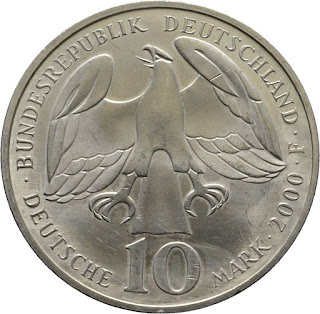Germany 10 Deutsche Mark Silver Coin 2000 Johann Sebastian Bach
Commemorative issue: 250th Anniversary - Johann Sebastian Bach's death
Obverse: German Eagle - Coat of arms of the Federal Republic of Germany.
Lettering: · BUNDESREPUBLIK DEUTSCHLAND · 10 DEUTSCHE MARK · 2000 · F
Reverse: Johann Sebastian Bach (aged 61) in a portrait by Elias Gottlob Haussmann. Titles of last works by Johann Sebastian Bach at the background.
Lettering: JOHAN SEBASTIAN BACH ·1685-1750 ·
Edge: Smooth with inscription.
Lettering: JOHANN SEBASTIAN BACH 250. TODESTAG.
Designer: Aase Thorsen.
Country: Germany - Federal Republic.
Year: 2000.
Value: 10 Deutsche Mark (10 DEM).
Metal: Silver (.925).
Weight: 15.5 g.
Diameter: 33 mm.
Shape: Round.
Johann Sebastian Bach
Johann Sebastian Bach (31 March [O.S. 21 March] 1685 – 28 July 1750) was a German composer and musician of the Baroque period. He enriched established German styles through his skill in counterpoint, harmonic and motivic organisation, and the adaptation of rhythms, forms, and textures from abroad, particularly from Italy and France. Bach's compositions include the Brandenburg Concertos, the Goldberg Variations, the Mass in B minor, two Passions, and over three hundred cantatas of which around two hundred survive. His music is revered for its technical command, artistic beauty, and intellectual depth.
Bach's abilities as an organist were highly respected during his lifetime, although he was not widely recognised as a great composer until a revival of interest and performances of his music in the first half of the 19th century. He is now generally regarded as one of the greatest composers of all time.
Bach was born in Eisenach, in the duchy of Saxe-Eisenach, into a great musical family. His father, Johann Ambrosius Bach, was the director of the town musicians, and all of his uncles were professional musicians. His father probably taught him to play the violin and harpsichord, and his brother, Johann Christoph Bach, taught him the clavichord and exposed him to much contemporary music. Apparently at his own initiative, Bach attended St. Michael's School in Lüneburg for two years. After graduating, he held several musical posts across Germany: he served as Kapellmeister (director of music) to Leopold, Prince of Anhalt-Köthen, and as Thomaskantor in Leipzig, a position of music director at the main Lutheran churches and educator at the Thomasschule. He received the title of "Royal Court Composer" from Augustus III in 1736. Bach's health and vision declined in 1749, and he died on 28 July 1750.

